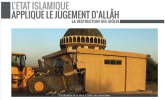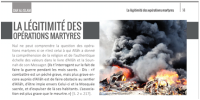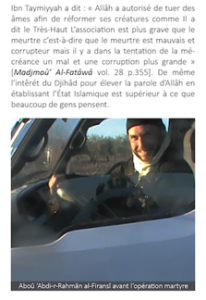The just war
Is this war just, does it conform to the rules imposed by Sunni legal tradition ? In the eyes of Dar-al-Islam it is a necessary, obligatory, just, and legitimate war , carried out according to the signals of the Prophet of Islam – who is amongst other things a war leader, and who has scarcely ever appeared otherwise in the propaganda of Daesh. It regularly returns to the verse which known as “the sword”: “And when the sacred months have passed, kill the polytheists, capture them, besiege them, and wait for them in every place of ambush, but if they should repent, make the Salat[1] , give zakat[2] , and let them go on their way. Indeed, Allah is forgiving and merciful.” (Surah 9, verse 5) – it appears clear to them that in this verse God is ordering the killing of idolaters wherever they are found and that the condition under which they should be spared is the embracing of Islam.
Dar-al-Islam contrasts the abode of unbelief and war with the abode of the Caliphate; the dar-al-kufr (the abode of unbelief) is in its essence a place of war, where the laws of 'holy war' apply: the blood of unbelievers is not sacred. Punishment is deserved , particularly that of 'crusaders' because they doubt the uniqueness “of Allah” - the West has assimilated the jahiliyah, idolatrous anti-Islamic society. The “people of war” (harbi) are not only the unbelievers who fight Islam but in fact all non Muslims, including women and children, unless, following a traditional judicial ruling, they are not to be targeted intentionally. So it is an obligatory and lawful war – supported by a variety of Surahs – carrying out the judgement of God (Bulletin No. 3 is entitled thus “The Islamic State carries out the judgement of Allah”), which does not forbid murder unless the unbeliever benefits from a pact with Islam. It is a war as response to those who unceasingly make war on Muslims – and the discourse constantly varies between offensive war (justified by tradition) and defensive war (when the analysis is a more political one).
« La destruction des idoles » Source : Dâr al-Islâm, n°3, p. 3. | La légitimité des opérations martyres Source : Dâr al-Islâm, n°3, p. 14. |
For this war on Islam is also cultural and ideological: “If those weak in spirit claim that the enemies of Allah do not fight us with arms, we respond that Ibn Taymiyah[3] has said: 'In religion war by the tongue can do more harm than war by the hand' [ Ahmad Ibn Taymiyah, as-Sarim al-Maslul, p 385].” War and terror are legitimate against those who are in “sin” - it is what engenders fear, their fear – and will allow no dealings, no let up. Dar-al-Islam is here making reference to Surah 3: “We shall put fear into the hearts of the unbelievers. For they have joined companions with Allah (idols) for which he has sent no authority; their abode will be the Fire.” The “martyrdom operations”, that is, terror attacks, are also legitimate: “None can understand the question of martyrdom operations unless he is one to whom Allah has given comprehension of the authentic scale of values in the Book of Allah and the Sunnah of His Messenger”. The terror attacks in Paris are thus justified by long casuistic development.
Dar-al-Islam affirms that unbelief is worse than murder : “The death of Moudjahid who sacrificed his life to raise the word of Allah and to destroy the maximum number of enemy unbelievers is still less serious than the fact that the land of Allah should be governed by the law of taghut[5].” To detest the 'unbelievers' for their religion is decreed, relying on many verses of the Qu'ran, as an obligation for every Muslim, and Dar-al-Islam frequently emphasises that unbelief is truly a motive for war. Dar-al-Islam published the thoughts of Abu Muqatil al-Tunisi, the assassin of the Tunisian politician Mohamed Brahmi; he suggested that specific targets need not be sought: “Kill anybody. All unbelievers are our targets. Don't bother to look for specific targets. Kill any unbeliever.” |
In recommendations for security addressed to Dar-al-Islam's readers who want to take action in the West, it refers, as it often does, to the juridical guide Ibn Taymiyyah to allow “in the land of war” the suspension of their religious obligations if it is the greater interest of religion: “If a Muslim is in a land of war or unbelief he is not commanded to identify unbelievers by their outward appearance, for that can cause harm. But it is recommended, however, and at times obligatory, that the Muslim should appear like an unbeliever if that is in the interests of religion [Iqtida as-Sirat al-Moustaqim p. 163]”. They are also with Ibn Taymiyyah when he speaks of apostasy and the raising of the standard of jihad in the “country of two holy places” (a reference here to Osama bin Laden's Declaration of jihad against the Americans occupying the country of the two holy places, who denounced the Saudi Arabians for opening its territories to American troops); Dar-al-Islam considers that the 'association' of something to God is more serious than murder: murder is evil and corrupting, but in the temptation of unbelief there is greater evil and corruption.
And to conclude on the lawfulness and obligation of war against the 'unbelievers' in putting it into an historical perspective: “The sacredness of blood is assured only for the Muslim or the unbeliever who has a pact with the Muslims (whether a pact of dhimmah[6] , an armistice, or a security pact). As for a harbi unbeliever, his blood has no value, as agreed by the consensus of the learned of Islam.”
This war is conceived as purification, its violence is purifying and brings salvation: death is the punishment of the “apostate” or “unbeliever”, to eradicate evil and allow a just society to emerge in conformity to the will of God: “To purify the lands of all these (sic) impurities”, says Dar-al-Islam, “May Allah extend the territory of the Caliphate and may He purify the lands of rafidi[7] impurities.” War, which “will not be interrupted until the last day” is marked by the death of the enemy of God, as a sacrificial offering. War is holy, it is waged in the name of God, for Him. It is the path to the glory of God, and to salvation. Those who die thereby are honoured as martyrs of God. The anthropologist Scott Atran, in his analysis of terrorism, speaks of an exalted campaign of purification through sacrificial deaths: it concerns the saving of Islam and, above all, the saving of humanity; the actors in this 'holy war' are thus rational actors, their eyes open to the blessings of what is, for them, “the Good”.
It is also total war, without distinction between civilians (the victims of the Paris attacks are defined as crusaders) and soldiers. . Should one reproach the soldiers of the Islamic State for their harshness? Dar-al-Islam tells us that they are only imitating the deeds of the Companions of the Prophet[8] , based on examples in the Qu'ran. For this violence is not blind, it is codified and justified by a Qu'ranic tradition carried through to the present: enslavement, amputation, crucifixion or decapitation are thus not uniquely the choice of violence as theatre, but a result of the application to the letter of inherited religious sanctions against transgressions of what is said to be divine law. Bulletin No. 8 of Dar-al-Islam aims to provide proof of the Islamic legitimacy of the attacks carried out in France and challenges the French Muslim authorities to demonstrate otherwise – to give their casuistic counter refutation, based on the same scriptural and juridical sources, and with the same remarkable detail.
Appel au combat par le « Calife des musulmans » Source : Dâr al-Islâm, n°2, p. 5. | Couverture du huitième numéro de Dâr al-Islâm |
This war is also a sacrifice: “We have men who love death as you love life”, writes the editor of Dar-al-Islam, once again referencing Bin Laden. He justifies the legitimacy of sacrifice through the story of the People of the Ditch, mentioned in the Surah Al-Buruj as not being suicide when it is a question of extending Islam by this means. Death is not death: again and again Dar-al-Islam recalls Surah 3, verses 169-170: “Do not think of those who have died in the cause of Allah as dead. On the contrary, they are alive, close to their Lord, well provided for and joyful in the favour which Allah bestows on them, and delighted at those who will come after them, and they do not fear or grieve for them.”












